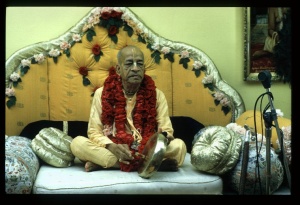SB 6.7.38: Difference between revisions
m (1 revision(s)) |
No edit summary |
||
| Line 1: | Line 1: | ||
{{info | {{info | ||
|speaker= | |speaker=Śukadeva Gosvāmī | ||
|listener=King | |listener=King Parīkṣit | ||
}} | }} | ||
[[Category:Srimad-Bhagavatam - Canto 06 Chapter 07]] | |||
[[Category:Bhagavatam Verses Spoken by Sukadeva Gosvami - Vanisource|060738]] | |||
<div style="float:left">'''[[Srimad-Bhagavatam]] - [[SB 6|Sixth Canto]] - [[SB 6.7: Indra Offends His Spiritual Master, Brhaspati|Chapter 7: Indra Offends His Spiritual Master, Bṛhaspati]]'''</div> | |||
<div style="float:right">[[File:Go-previous.png|link=SB 6.7.37]] '''[[SB 6.7.37]] - [[SB 6.7.39]]''' [[File:Go-next.png|link=SB 6.7.39]]</div> | |||
{{RandomImage}} | |||
==== TEXT 38 ==== | ==== TEXT 38 ==== | ||
<div class="verse"> | |||
<div | :śrī-bādarāyaṇir uvāca | ||
śrī-bādarāyaṇir uvāca | :tebhya evaṁ pratiśrutya | ||
tebhya evaṁ pratiśrutya | :viśvarūpo mahā-tapāḥ | ||
viśvarūpo mahā-tapāḥ | :paurahityaṁ vṛtaś cakre | ||
paurahityaṁ vṛtaś cakre | :parameṇa samādhinā | ||
parameṇa samādhinā | |||
</div> | </div> | ||
| Line 18: | Line 23: | ||
==== SYNONYMS ==== | ==== SYNONYMS ==== | ||
<div class="synonyms"> | |||
<div | ''śrī-bādarāyaṇiḥ uvāca''—Śrī Śukadeva Gosvāmī said; ''tebhyaḥ''—unto them (the demigods); ''evam''—thus; ''pratiśrutya''—promising; ''viśvarūpaḥ''—Viśvarūpa; ''mahā-tapāḥ''—the most exalted personality; ''paurahityam''—the priesthood; ''vṛtaḥ''—surrounded by them; ''cakre''—executed; ''parameṇa''—supreme; ''samādhinā''—with attention. | ||
śrī-bādarāyaṇiḥ | |||
</div> | </div> | ||
| Line 26: | Line 30: | ||
==== TRANSLATION ==== | ==== TRANSLATION ==== | ||
<div class="translation"> | |||
<div | |||
Śrī Śukadeva Gosvāmī continued: O King, after making this promise to the demigods, the exalted Viśvarūpa, surrounded by the demigods, performed the necessary priestly activities with great enthusiasm and attention. | Śrī Śukadeva Gosvāmī continued: O King, after making this promise to the demigods, the exalted Viśvarūpa, surrounded by the demigods, performed the necessary priestly activities with great enthusiasm and attention. | ||
</div> | </div> | ||
| Line 33: | Line 36: | ||
==== PURPORT ==== | ==== PURPORT ==== | ||
<div class="purport"> | |||
The word ''samādhinā'' is very important. ''Samādhi'' means complete absorption with an undiverted mind. Viśvarūpa, who was a most learned ''brāhmaṇa'', not only accepted the request of the demigods, but took their request seriously and performed the activities of priesthood with an undiverted mind. In other words, he accepted the priesthood not for material gain, but to profit the demigods. Such is the duty of a priest. The word ''puraḥ'' means "family," and ''hita'' means "benefit." Thus the word ''purohita'' indicates that the priest is the well-wisher of the family. Another meaning of the word ''puraḥ'' is "first." A priest's first duty is to see that his disciples benefit spiritually and materially by all means. Then he is satisfied. A priest should never be interested in performing Vedic rituals for his personal benefit. | |||
</div> | |||
<div | <div style="float:right; clear:both;">[[File:Go-previous.png|link=SB 6.7.37]] '''[[SB 6.7.37]] - [[SB 6.7.39]]''' [[File:Go-next.png|link=SB 6.7.39]]</div> | ||
__NOTOC__ | |||
</div> | __NOEDITSECTION__ | ||
__NOTOC__ | |||
Revision as of 04:01, 13 May 2021

A.C. Bhaktivedanta Swami Prabhupada
TEXT 38
- śrī-bādarāyaṇir uvāca
- tebhya evaṁ pratiśrutya
- viśvarūpo mahā-tapāḥ
- paurahityaṁ vṛtaś cakre
- parameṇa samādhinā
SYNONYMS
śrī-bādarāyaṇiḥ uvāca—Śrī Śukadeva Gosvāmī said; tebhyaḥ—unto them (the demigods); evam—thus; pratiśrutya—promising; viśvarūpaḥ—Viśvarūpa; mahā-tapāḥ—the most exalted personality; paurahityam—the priesthood; vṛtaḥ—surrounded by them; cakre—executed; parameṇa—supreme; samādhinā—with attention.
TRANSLATION
Śrī Śukadeva Gosvāmī continued: O King, after making this promise to the demigods, the exalted Viśvarūpa, surrounded by the demigods, performed the necessary priestly activities with great enthusiasm and attention.
PURPORT
The word samādhinā is very important. Samādhi means complete absorption with an undiverted mind. Viśvarūpa, who was a most learned brāhmaṇa, not only accepted the request of the demigods, but took their request seriously and performed the activities of priesthood with an undiverted mind. In other words, he accepted the priesthood not for material gain, but to profit the demigods. Such is the duty of a priest. The word puraḥ means "family," and hita means "benefit." Thus the word purohita indicates that the priest is the well-wisher of the family. Another meaning of the word puraḥ is "first." A priest's first duty is to see that his disciples benefit spiritually and materially by all means. Then he is satisfied. A priest should never be interested in performing Vedic rituals for his personal benefit.